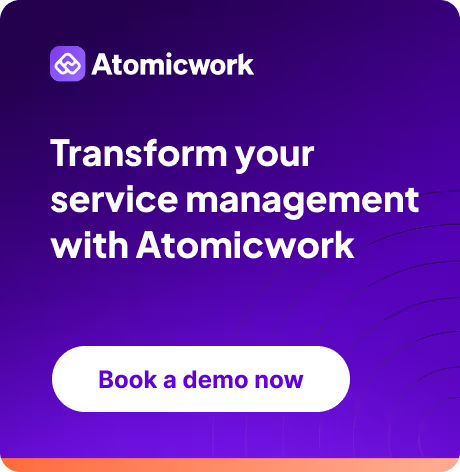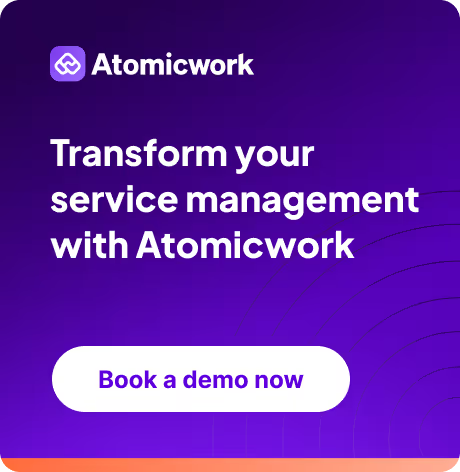Introducing agentic service management for improved enterprise productivity

IT teams are burdened with fragmented workplace technologies and process-intensive workflows with limited automation and high human overhead. Password resets, account unlocks, software installations, and basic troubleshooting—all require significant human effort. These requests end up being a time sink for your IT team, leaving them time-pressed for more complex problems.
This could soon be a thing of the past with Atomicwork’s agentic service management. Our goal is straightforward and simple— empower IT teams to focus on strategic initiatives that drive real business while AI agents manage complex, routine business workflows.
What made us think about agentic AI?
A critical challenge in IT service management is the limitations of legacy solutions that require considerable effort to balance routine tasks and system-level workflows. Plus, when workflows demand human involvement, the complexity only intensifies, as these solutions are not equipped to handle human-in-the-loop processes that require intuition and reasoning.
Unlike legacy tools, adopting an agentic AI approach can autonomously take care of multi-step workflows without requiring extensive configuration. An agentic AI platform can ask clarifying questions, manage stakeholder approvals, troubleshoot issues, and even suggest solutions based on helpdesk history—all while reducing manual effort and intervention (more on it below).
With Atomicwork’s Agentic Service Management, enterprises can deploy out-of-the-box workflows to handle tasks autonomously for unique business needs across departments.
As we like to put it, agentic AI is for the routine, and humans are for the remarkable.
How does it work?
So far, our RAG (Retrieval-Augmented Generation) workflows have access to vast data across different sources which they synthesize to predict what the best answer for a ticket is.
Taking the agentic AI approach, AI agents can access both historical memory and the current context to reason out the logical next step and take an appropriate action.
Here are a few use cases which you can see immediate benefits from by adopting agentic service management.
- Knowledge discovery: In most workplaces, employees struggle to find answers as enterprise knowledge is scattered across multiple systems. The Knowledge Agent streamlines this pulling contextually relevant information from knowledge bases and integrated apps. It operates with robust security measures and guardrails to ensure that sensitive data remains protected.
- Intelligent routing: When an employee submits a request, it often waits to be assigned to the right team, further slowed by repeated back-and-forth for context—frustrating users and delaying resolutions. The Support Agent speeds up service by intelligently routing tickets to the right teams and clarifying context, reducing resolution times.
Instead of repetitive queries, the Support Agent also learns from past interactions and asks clarifying questions to gather context, ensuring fewer back-and-forths and follow-ups. - Smart incident management: The Incident Management Agent identifies patterns in recurring issues, proactively suggesting fixes to prevent future disruptions and improving resolution times. For example, it might flag configuration changes causing multiple VPN issues and recommend a rollback.
- Automated service workflows: The Automation Agent empowers employee self-service with one-click workflows for tasks like password resets or software access, directly within collaboration platforms like Slack or MS Teams. Employees can simply type requests, and the Agent handles permissions, approvals, and execution in seconds.
These use cases are just the tip of the iceberg. By connecting our agentic service management platform to different apps used within your enterprise, you can handle more workflows autonomously. This solution represents a shift in enterprise IT—transforming from manual, high-overhead operations to efficient, intelligent automation.
We’re thrilled to support IT teams in navigating this exciting new chapter in service management. Talk to our team to learn more about how AI agents can benefit your enterprise teams.
You may also like...

































